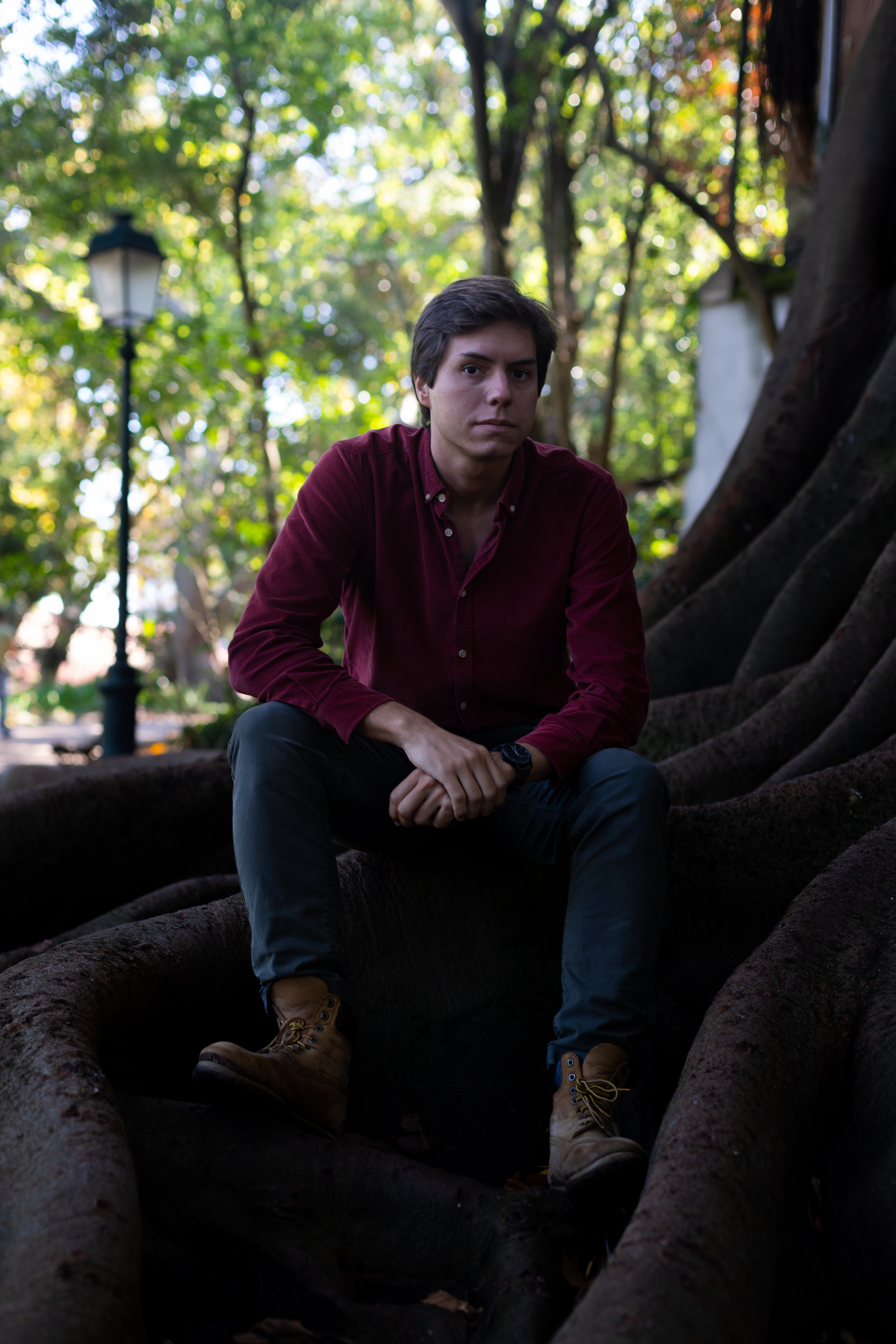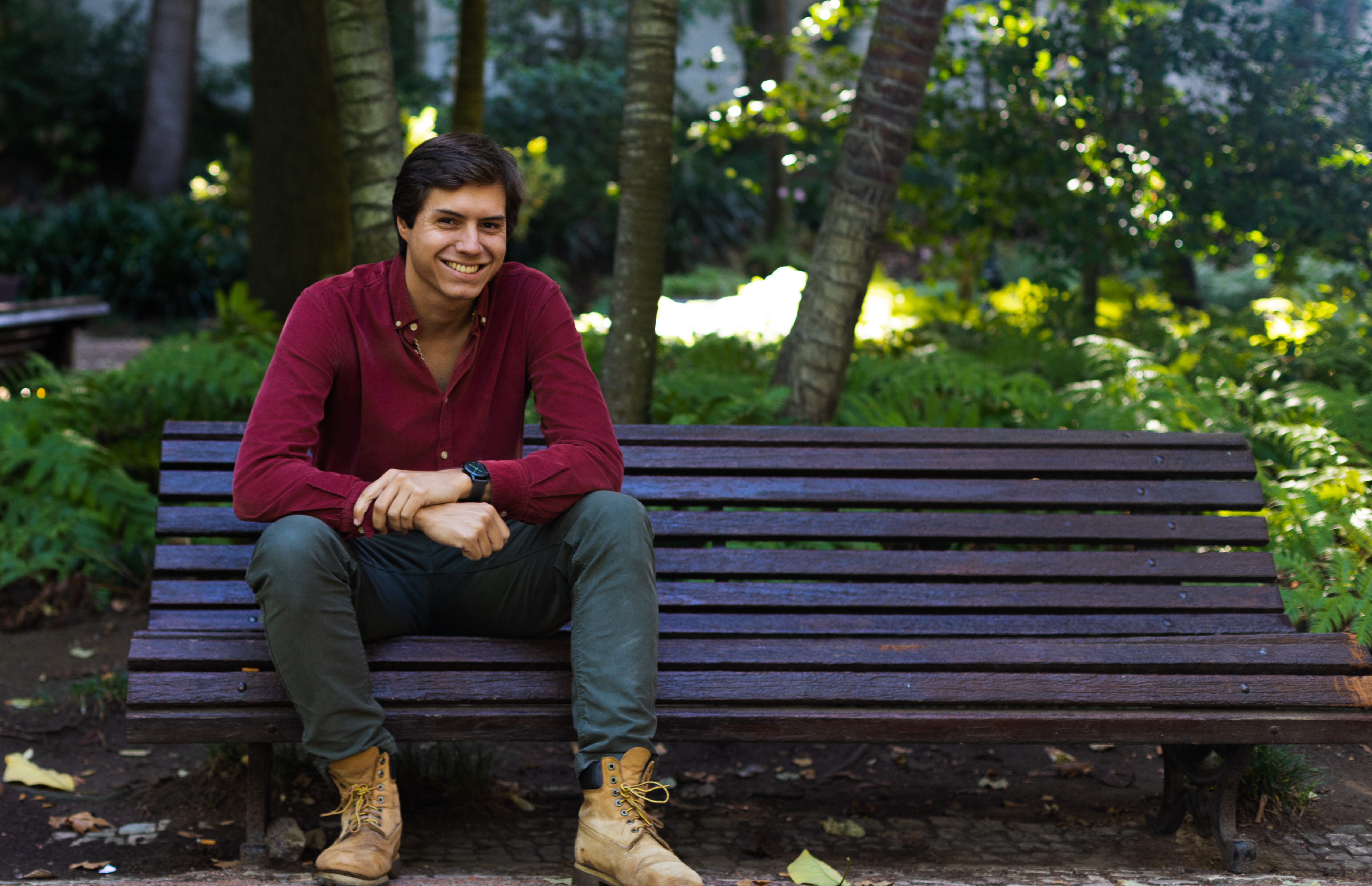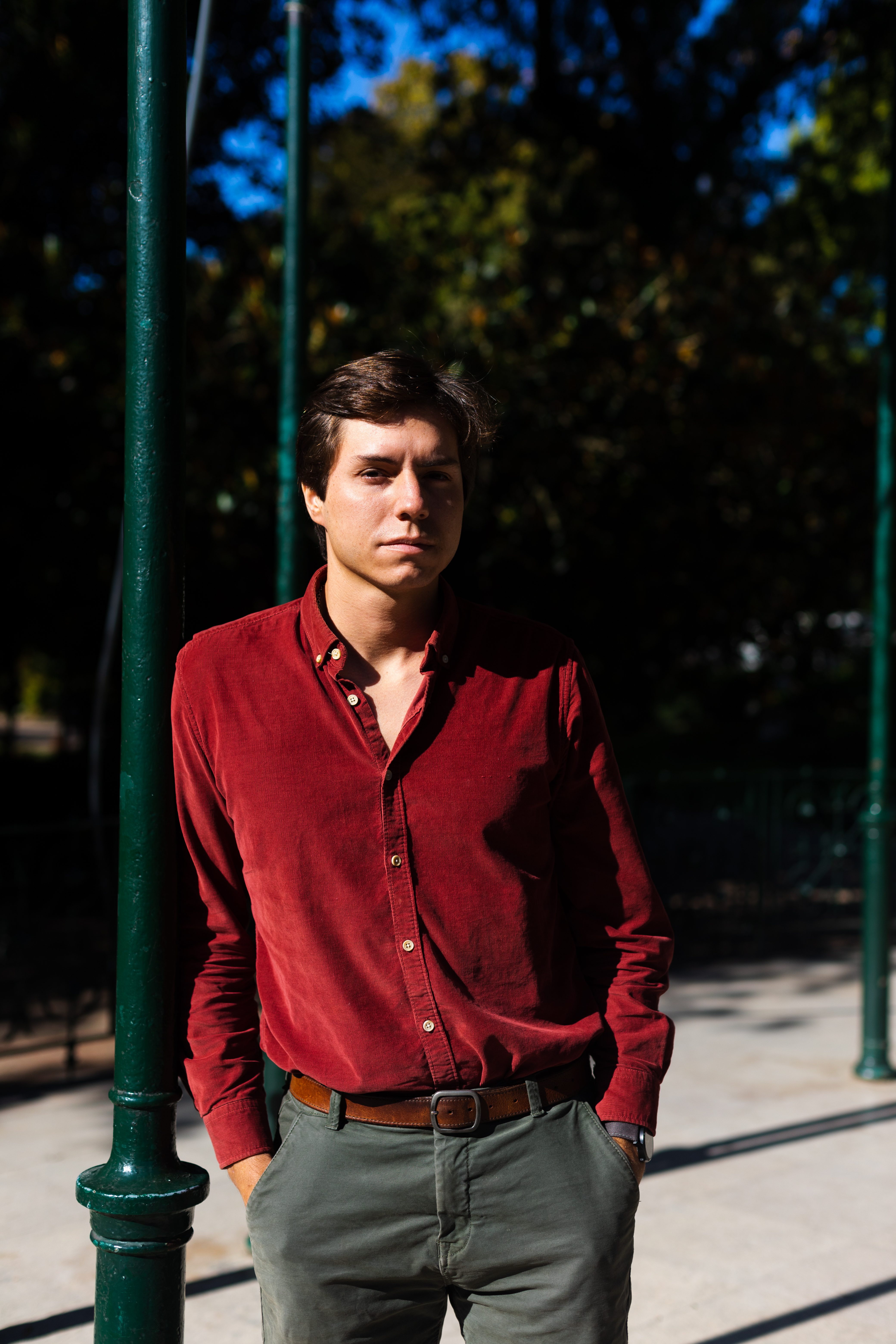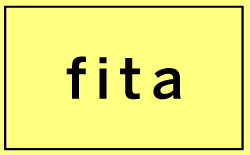FITA Magazine Vol. II / Garden Constellation
Afonso Reis Cabral
Interview by Francisca Gigante
and Francisco Teles da Gama
![]()
Photograph © António Saldanha
We find ourselves at one of the gates of the Estrela Garden, in front of the monumental XVIII century Basilica. In front of us, a garden that is actually called Guerra Junqueiro, although nobody knows it. We can say that here Afonso Reis Cabral meets one of the most prestigious Portuguese poets of the 19th century.
Afonso Reis Cabral became interested in writing at a very young age through poetry, having published Condensação (Condensation), an anthology of all his poetry written as a teenager. Besides the literary fame that we know so well, this young revelation has a wide experience in the publishing world, having reviewed, edited, and supported the publication process of several works. With a Bachelors’ degree and Master’s in Portuguese Studies from Nova University of Lisbon, he developed research on the Romano Torres publishing house.
It was in 2014 that Afonso Reis Cabral saw his life change forever, transforming his role from editor to writer, when he won the coveted Leya Literary Prize with the work O Meu Irmão (My Brother). In this work, one could already see that this writer had no problem facing deeper themes of the human condition.
Despite having won one of the most prestigious awards in the Portuguese literary world, Afonso would not stop there. Just as the Portuguese Luís Vaz de Camões, Fernando Pessoa, and José Saramago would leave their mark on the world, so Afonso would see his work translated and disseminated abroad. While we are talking about these renowned authors, it is good to remember that this young writer would receive the José Saramago Literary Prize with his second novel entitled Pão de Açúcar (Sugar Loaf) in 2019.
The path of writing is an arduous and demanding one, however, the multiple efforts he has made to embark on this journey have had an effect. This writer is an example of how perseverance and talent make it possible to achieve a dream career. We open the books and surrender ourselves to Afonso’s life stories.
How did you become interested in writing? Did someone encouraged you to write?
Actually, writing starts before writing because my family environment is very connected to books. My parents are great readers, so at home many of my toys were simply the books. I would play with the books, picking them up and changing their order. Later, in 1999, the fado singer Amália died and on that occasion I awakened more to the perspective of writing. Because Amália sang, besides the traditional fado, the great poets, from Camões to contemporaries. This awakened a challenge in me, which was to respond to that poetry. That’s why I started writing poetry, I’m not a poet by any means, I was a bad poet, I only wrote from the age of nine to fifteen. But it was the dawn, the beginning of writing in that context.
Novel writing in its essence could be a human emotional response through language in the form of writing. Are you most inspired by stories that family and friends tell you?
I don’t believe that writing is an emotional response through language. I think it is an artistic response, in being artistic it is much more than merely an emotional or confessional issue, as perhaps the question intones. Which is to say that it’s actually a construction, often on nothing, on a certain do. Thinking about chronicles, a small sentence or a small story told to me, in between conversations of friends or family, I realize that there is something missing there. In Pão de Açúcar (Sugar Loaf) my goal was not simply to make a literary report about a real case. What instigated me from the very beginning was to realize that I could put some detail that was missing in that story.
Which story has stayed year after year in your mind?
The stories I tell in my books, that raw material that I hope is alive, I try to put in a certain underground. Because otherwise I would be permanently excited, as I am at the moment of writing, of pure attachment to the story. When I finish writing the novel the process is very different, because the book stops being art to be saleable. There is a sentence by José Cardoso Pires that says that a book is art and literature when it is being written and is merchandise when it is being sold. So, I’m not exactly always thinking about what I wrote in the novels. For example, in the book O Meu Irmão (My Brother), which is now ten years since I started writing, I don’t remember much of what I tell there.
![]()
Photograph © António Saldanha
Afonso Reis Cabral
Reading On The Grass
Interview by Francisca Gigante
and Francisco Teles da Gama

Photograph © António Saldanha
We find ourselves at one of the gates of the Estrela Garden, in front of the monumental XVIII century Basilica. In front of us, a garden that is actually called Guerra Junqueiro, although nobody knows it. We can say that here Afonso Reis Cabral meets one of the most prestigious Portuguese poets of the 19th century.
Afonso Reis Cabral became interested in writing at a very young age through poetry, having published Condensação (Condensation), an anthology of all his poetry written as a teenager. Besides the literary fame that we know so well, this young revelation has a wide experience in the publishing world, having reviewed, edited, and supported the publication process of several works. With a Bachelors’ degree and Master’s in Portuguese Studies from Nova University of Lisbon, he developed research on the Romano Torres publishing house.
It was in 2014 that Afonso Reis Cabral saw his life change forever, transforming his role from editor to writer, when he won the coveted Leya Literary Prize with the work O Meu Irmão (My Brother). In this work, one could already see that this writer had no problem facing deeper themes of the human condition.
Despite having won one of the most prestigious awards in the Portuguese literary world, Afonso would not stop there. Just as the Portuguese Luís Vaz de Camões, Fernando Pessoa, and José Saramago would leave their mark on the world, so Afonso would see his work translated and disseminated abroad. While we are talking about these renowned authors, it is good to remember that this young writer would receive the José Saramago Literary Prize with his second novel entitled Pão de Açúcar (Sugar Loaf) in 2019.
The path of writing is an arduous and demanding one, however, the multiple efforts he has made to embark on this journey have had an effect. This writer is an example of how perseverance and talent make it possible to achieve a dream career. We open the books and surrender ourselves to Afonso’s life stories.
How did you become interested in writing? Did someone encouraged you to write?
Actually, writing starts before writing because my family environment is very connected to books. My parents are great readers, so at home many of my toys were simply the books. I would play with the books, picking them up and changing their order. Later, in 1999, the fado singer Amália died and on that occasion I awakened more to the perspective of writing. Because Amália sang, besides the traditional fado, the great poets, from Camões to contemporaries. This awakened a challenge in me, which was to respond to that poetry. That’s why I started writing poetry, I’m not a poet by any means, I was a bad poet, I only wrote from the age of nine to fifteen. But it was the dawn, the beginning of writing in that context.
Novel writing in its essence could be a human emotional response through language in the form of writing. Are you most inspired by stories that family and friends tell you?
I don’t believe that writing is an emotional response through language. I think it is an artistic response, in being artistic it is much more than merely an emotional or confessional issue, as perhaps the question intones. Which is to say that it’s actually a construction, often on nothing, on a certain do. Thinking about chronicles, a small sentence or a small story told to me, in between conversations of friends or family, I realize that there is something missing there. In Pão de Açúcar (Sugar Loaf) my goal was not simply to make a literary report about a real case. What instigated me from the very beginning was to realize that I could put some detail that was missing in that story.
Which story has stayed year after year in your mind?
The stories I tell in my books, that raw material that I hope is alive, I try to put in a certain underground. Because otherwise I would be permanently excited, as I am at the moment of writing, of pure attachment to the story. When I finish writing the novel the process is very different, because the book stops being art to be saleable. There is a sentence by José Cardoso Pires that says that a book is art and literature when it is being written and is merchandise when it is being sold. So, I’m not exactly always thinking about what I wrote in the novels. For example, in the book O Meu Irmão (My Brother), which is now ten years since I started writing, I don’t remember much of what I tell there.

Photograph © António Saldanha
In the last years, we have learned about
the influence that Eça de Queirós, your
great-great-grandfather, has had in your
writing. Are there any great life examples
from which you have learned the biggest
lessons?
One of the writers I admire most is John Steinbeck. I identify very much with his writing; with a certain simplicity he has to achieve depth.Of Mice and Men is an extraordinary novel in that sense, very well done. But also The Grapes of Wrath, which is a monumental novel, and also East of Eden. I identify with him not only for his writing, but also as a master, at least at this stage of my life. Steinbeck wrote a diary during the six months it took to createThe Grapes of Wrath. That diary is about the act of writing, the routine, the challenges he has in each scene or the narrative of the novel. I have read this diary several times and it gives me a lot of guidance in terms of writing.
Both in O Meu Irmão (My Brother) as in Pão de Açúcar (Sugar-Loaf), published by Leya and D. Quixote respectively, the characters you create are portrayed in a very profound artistic manner, exploring the deepest personality traits. You manage to make us feel like we have known them forever. What can’t be missing in a story that is told by Afonso?
I think I’m still discovering themes of interest and literary motifs that grab me. So far what I have found interesting to explore is particularly the unreliable first person narrator. A narrator where good and evil are very close and who manipulates the re- ader. I am hoping that the reader will be attracted to the narrator, empathize with him, and then be betrayed by the narrator himself as well. I hope that this has not been lacking in my books. So far it is a literary perspective that I have enjoyed exploring.
Which books or book passages could be found in your bedside? Do they transport you to any favorite gardens in Lisbon? To any favorite gardens in the world?
At the moment, on my bedside table, besides some books I have to read, one that is there is DSM-5 - Diagnostic and Statistical Manual of Mental Disorders, which I just bought at the Lisbon Book Fair and have been consulting to see some bottomless pits of human experience, without wanting to sound grandiloquent. The truth is that we are all very close to stumbling into madness and this book helps me to look at some things in a more objective way. It’s a giant tome that’s on my bedside table right now, but I don’t particularly like having it there. What combats this almost stumbling into madness, when reading this book, is to take a nice walk in the garden. One garden I really like is the Tapada das Necessidades, which is very badly treated and is involved in controversy because of the project they are going to build there, which I don’t agree with at all. I think that before any construction project one should simply preserve what exists, the statues, the old houses, the greenhouse. It’s a very beautiful garden, discreet and not very frequented, so it’s very nice to go for a walk or to read on the grass.
After the great success of the novels O Meu Irmão, Pão de Açúcar, you have recently published Leva-me Contigo (Take me with you) by D. Quixote, while travelling for twenty-four days by foot across the country through the Portuguese biggest road, EN2. Do you think of it as a moment of stopping to contemplate the landscape? Or as a pilgrimage with the mission of getting to know a population that lives daily with the feeling of saudade? What was at the core of this desire?
The Estrada Nacional 2 (National Road 2) trip had absolutely nothing to do with nostalgia, or with anything that we can identify as very Portuguese, although I crossed the entire country on foot from north to south, like a window to Portugal. It was more the idea of a retreat and an examination of conscience, that is, a balance of life in my 29 years. As I am very restless, there is nothing like combining this with a physical challenge at a time when no one had ever walked the EN2 alone. In fact, I was really alone, but deeply accompanied, by the people who followed the trip on social networks and got excited, something I had not expected and which impressed me a lot.
Most of our friends are venturing into the world of arts and culture. What steps do you advise they take when building their professional career as writers?
It’s kind of ungrateful for me to be in the position of giving advice, I don’t want to give advice. I can think of one piece of advice that I think is good for me and that could be different for someone else. What I have noticed from my experience in writing is that it takes a lot of work, not just relying on inspiration or the fleeting moment. That work is literature, that is, it is work that is not work, it is a discovery of the world.
![]()
Photograph © António Saldanha
Can we expect new publications authored by Afonso and published by D. Quixote soon?
I would like to say that a new novel is coming very soon, but it’s not quite like that. It is a very difficult process, of fighting with myself, of a great beating that I give myself. Right now, I’m still getting beaten up, so until I’m knocked out it might take me a little while. I don’t know when the next book will be published, but I’d like it to be in the near future.
The interview to Afonso Reis Cabral was published on pages 62 to 66 in the Estrela Garden chapter of FITA Magazine Vol. II / Garden Constellation dedicated to the city of Lisbon.
One of the writers I admire most is John Steinbeck. I identify very much with his writing; with a certain simplicity he has to achieve depth.Of Mice and Men is an extraordinary novel in that sense, very well done. But also The Grapes of Wrath, which is a monumental novel, and also East of Eden. I identify with him not only for his writing, but also as a master, at least at this stage of my life. Steinbeck wrote a diary during the six months it took to createThe Grapes of Wrath. That diary is about the act of writing, the routine, the challenges he has in each scene or the narrative of the novel. I have read this diary several times and it gives me a lot of guidance in terms of writing.
Both in O Meu Irmão (My Brother) as in Pão de Açúcar (Sugar-Loaf), published by Leya and D. Quixote respectively, the characters you create are portrayed in a very profound artistic manner, exploring the deepest personality traits. You manage to make us feel like we have known them forever. What can’t be missing in a story that is told by Afonso?
I think I’m still discovering themes of interest and literary motifs that grab me. So far what I have found interesting to explore is particularly the unreliable first person narrator. A narrator where good and evil are very close and who manipulates the re- ader. I am hoping that the reader will be attracted to the narrator, empathize with him, and then be betrayed by the narrator himself as well. I hope that this has not been lacking in my books. So far it is a literary perspective that I have enjoyed exploring.
Which books or book passages could be found in your bedside? Do they transport you to any favorite gardens in Lisbon? To any favorite gardens in the world?
At the moment, on my bedside table, besides some books I have to read, one that is there is DSM-5 - Diagnostic and Statistical Manual of Mental Disorders, which I just bought at the Lisbon Book Fair and have been consulting to see some bottomless pits of human experience, without wanting to sound grandiloquent. The truth is that we are all very close to stumbling into madness and this book helps me to look at some things in a more objective way. It’s a giant tome that’s on my bedside table right now, but I don’t particularly like having it there. What combats this almost stumbling into madness, when reading this book, is to take a nice walk in the garden. One garden I really like is the Tapada das Necessidades, which is very badly treated and is involved in controversy because of the project they are going to build there, which I don’t agree with at all. I think that before any construction project one should simply preserve what exists, the statues, the old houses, the greenhouse. It’s a very beautiful garden, discreet and not very frequented, so it’s very nice to go for a walk or to read on the grass.
After the great success of the novels O Meu Irmão, Pão de Açúcar, you have recently published Leva-me Contigo (Take me with you) by D. Quixote, while travelling for twenty-four days by foot across the country through the Portuguese biggest road, EN2. Do you think of it as a moment of stopping to contemplate the landscape? Or as a pilgrimage with the mission of getting to know a population that lives daily with the feeling of saudade? What was at the core of this desire?
The Estrada Nacional 2 (National Road 2) trip had absolutely nothing to do with nostalgia, or with anything that we can identify as very Portuguese, although I crossed the entire country on foot from north to south, like a window to Portugal. It was more the idea of a retreat and an examination of conscience, that is, a balance of life in my 29 years. As I am very restless, there is nothing like combining this with a physical challenge at a time when no one had ever walked the EN2 alone. In fact, I was really alone, but deeply accompanied, by the people who followed the trip on social networks and got excited, something I had not expected and which impressed me a lot.
Most of our friends are venturing into the world of arts and culture. What steps do you advise they take when building their professional career as writers?
It’s kind of ungrateful for me to be in the position of giving advice, I don’t want to give advice. I can think of one piece of advice that I think is good for me and that could be different for someone else. What I have noticed from my experience in writing is that it takes a lot of work, not just relying on inspiration or the fleeting moment. That work is literature, that is, it is work that is not work, it is a discovery of the world.

Photograph © António Saldanha
Can we expect new publications authored by Afonso and published by D. Quixote soon?
I would like to say that a new novel is coming very soon, but it’s not quite like that. It is a very difficult process, of fighting with myself, of a great beating that I give myself. Right now, I’m still getting beaten up, so until I’m knocked out it might take me a little while. I don’t know when the next book will be published, but I’d like it to be in the near future.
The interview to Afonso Reis Cabral was published on pages 62 to 66 in the Estrela Garden chapter of FITA Magazine Vol. II / Garden Constellation dedicated to the city of Lisbon.

